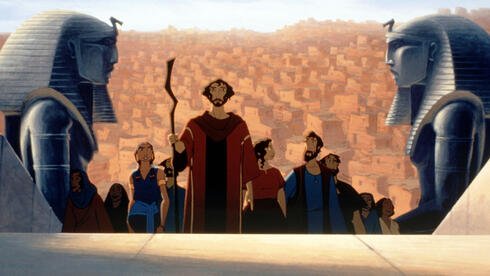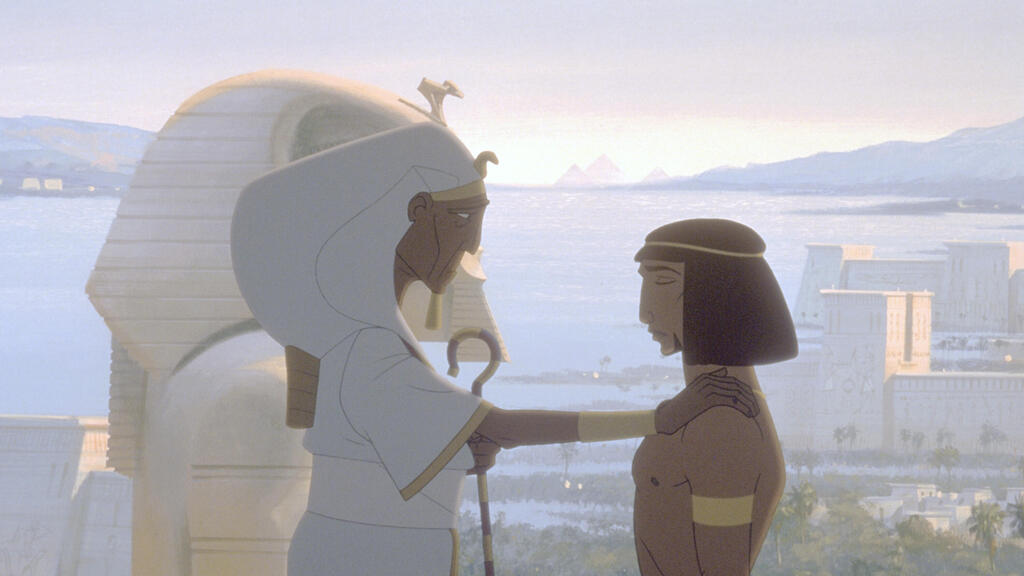In the end, Passover traditions tend to stay pretty much the same. You'll see matzo balls and gefilte fish gracing nearly every table, kids scampering around looking for the afikoman, and perhaps you've even heard of the quirkier customs—like playfully whacking each other with green onions or passionately cursing our enemies.
But the person writing these lines has a Passover ritual that's probably not shared by anyone else. For as long as I can remember, every Passover my brother and I set aside time for our annual festive screening of "The Prince of Egypt."
From 'The Prince of Egypt'
It's a tradition that's lasted at least 16 years, maybe more, and it's so deeply ingrained that even during the one year my brother was living abroad, we still managed to watch together via a transatlantic Skype call (you do remember Skype, don't you? That ancient relic before Zoom that your kids probably don't recognize), carefully clicking "play" at the exact same moment.
Totally normal behavior, right? But that's precisely the kind of devotion inspired by one of the greatest animated films ever made—a masterpiece that, through some inexplicable oversight, never received its proper due and rarely appears in conversations and rankings about animation classics.
What exactly sets it apart? In a word: Everything.
Let's backtrack a bit: It all started in October 1994, when three titans of entertainment—who happened to be nice Jewish boys every girl would love to bring home to mama—came together to form DreamWorks Studios. There was Jeffrey Katzenberg, who had recently left his role as the head of animation at Walt Disney (following a messy dispute), where he oversaw beloved films like "The Lion King," "Beauty and the Beast," and "Aladdin"; legendary music producer David Geffen; and a friendly fellow named Steven Spielberg. For their first major animated project, they chose a decidedly unconventional story—the biblical epic of the Exodus (although "Antz" ended up premiering first).
"We didn't want to tell fairy tales, we wanted epic drama. We were looking for larger-than-life stories," Katzenberg explained in an interview. Spielberg himself had suggested doing a feature about the Ten Commandments, prompting Katzenberg to recall: "After my jaw dropped to the floor, I said, 'That's a wonderful idea.'"
Choosing such a solemn story for an animated feature—usually considered children's territory—was undeniably bold, perhaps even baffling. It certainly wasn't something Disney would have attempted. Disney typically stuck to lighter fare filled with talking animals and magical beings, always playing it safe. Even their more daring ventures, like "The Hunchback of Notre Dame," which involves a religious figure grappling with his inappropriate attraction to Esmeralda and contemplating burning her at the stake, still arrived wrapped in Disney's trademark family-friendly package.
But "The Prince of Egypt," released in 1998, was something else entirely. Instead of watering down the complexities of its source material, the filmmakers dared to explore it more deeply. They zeroed in on the deeply personal, complicated relationship between Moses and Ramses—a layer largely absent from the original biblical text. The scene where Ramses pleads desperately with Moses to stay still brings me to tears. This was a mature animated film that spoke honestly to its audience, without relying on talking dragons or flying carpets, tackling relatable themes like sibling rivalry head-on.
Last week, actor Val Kilmer died at just 65. Headlines worldwide mourned the death of Batman or Iceman ("Top Gun"), but few mentioned that Moses himself had departed—yet Kilmer was indeed the voice of Moses in the film. He was part of a legendary ensemble cast that also featured Ralph Fiennes (fresh off "Schindler's List" and "The English Patient," and later Voldemort in the "Harry Potter" series), Patrick Stewart ("Star Trek"), Michelle Pfeiffer, Sandra Bullock, Martin Short and Steve Martin (who would later reunite for "Only Murders in the Building"), Jeff Goldblum, and Helen Mirren. This lineup would rival even Marvel's most extravagant casting announcements in 2025.
This was a mature animated film that spoke honestly to its audience, without relying on talking dragons or flying carpets, tackling relatable themes like sibling rivalry head-on
Such an impressive roster of stars was uncommon in animation, where studios typically relied on just one or two big-name draws (like Robin Williams or Eddie Murphy), backed by lesser-known voice actors. But the heavyweight cast of "The Prince of Egypt" was just one of many aspects that set it apart.
If Katzenberg learned anything during his Disney years, it's that animated films live or die by their music. Recognizing this, DreamWorks recruited not only a stellar cast but also musical giants. Renowned composer and lyricist Stephen Schwartz—who'd later return to prominence with the musical "Wicked"—crafted the film's memorable songs, partnering with legendary composer Hans Zimmer.
Pop icons Whitney Houston and Mariah Carey performed the Oscar-winning theme song "When You Believe," but perhaps even more meaningful for our little country was the involvement of Israeli singer Ofra Haza. She lent her voice to the character of Yocheved, Moses' mother, singing the haunting "Deliver Us," even inserting a brief Hebrew line into the original English track: "Yaldi hatov veharach, al tira ve'al tifchad" ("My good and tender child, don't be afraid"). Haza recorded the song in no less than 19 languages, including Czech, Romanian, Portuguese and German.
Ironically, many of the film's greatest strengths also proved challenging. The choice of the Exodus story itself was risky, given its serious tone and religious undertones—hardly crowd-pleasing material. Additionally, DreamWorks was a tiny newcomer compared to animation giants like Disney, who dominated the market. When Disney was busy promoting "Mulan" with limited-edition Szechuan sauce at McDonald's (shout-out to "Rick and Morty" fans), how much attention could a fledgling competitor realistically attract, no matter how ambitious?
Ultimately, "The Prince of Egypt" required a mature, discerning audience to truly appreciate its stunning visuals, meticulous craftsmanship, and deeply human storytelling—not to mention the undeniable fact that Moses was handsome (sorry, it's true!). In a world where sequels like "Moana 2" effortlessly rake in over a billion dollars (sure, several decades later, but humanity hasn't changed much), maybe a film like "The Prince of Egypt" never stood a chance. Because, after all, there may not always be miracles.





